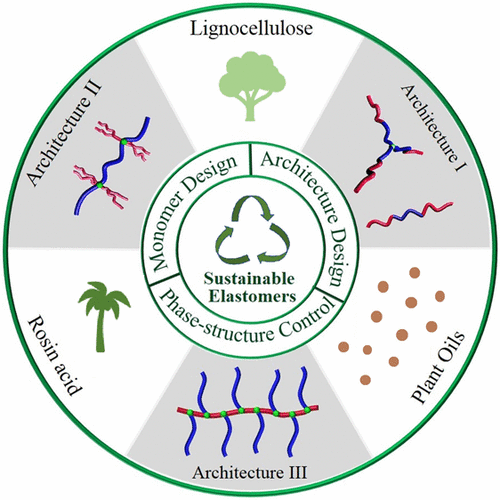当前位置:
X-MOL 学术
›
Acc. Chem. Res.
›
论文详情
Our official English website, www.x-mol.net, welcomes your
feedback! (Note: you will need to create a separate account there.)
Sustainable Elastomers from Renewable Biomass
Accounts of Chemical Research ( IF 16.4 ) Pub Date : 2017-06-21 00:00:00 , DOI: 10.1021/acs.accounts.7b00209 Zhongkai Wang 1, 2 , Liang Yuan 2 , Chuanbing Tang 2
Accounts of Chemical Research ( IF 16.4 ) Pub Date : 2017-06-21 00:00:00 , DOI: 10.1021/acs.accounts.7b00209 Zhongkai Wang 1, 2 , Liang Yuan 2 , Chuanbing Tang 2
Affiliation

|
Sustainable elastomers have undergone explosive growth in recent years, partly due to the resurgence of biobased materials prepared from renewable natural resources. However, mounting challenges still prevail: How can the chemical compositions and macromolecular architectures of sustainable polymers be controlled and broadened? How can their processability and recyclability be enabled? How can they compete with petroleum-based counterparts in both cost and performance? Molecular-biomass-derived polymers, such as polymyrcene, polymenthide, and poly(ε-decalactone), have been employed for constructing thermoplastic elastomers (TPEs). Plant oils are widely used for fabricating thermoset elastomers. We use abundant biomass, such as plant oils, cellulose, rosin acids, and lignin, to develop elastomers covering a wide range of structure–property relationships in the hope of delivering better performance.
中文翻译:

来自可再生生物质的可持续弹性体
近年来,可持续的弹性体经历了爆炸性的增长,部分原因是由可再生自然资源制备的生物基材料的复兴。但是,仍然存在越来越多的挑战:如何控制和拓宽可持续聚合物的化学成分和大分子结构?如何实现其可加工性和可回收性?他们如何在成本和性能上与石油同行竞争?分子生物质衍生的聚合物,例如聚月桂烯,聚丙烯和聚(ε-癸内酯),已被用于构建热塑性弹性体(TPE)。植物油被广泛用于制造热固性弹性体。我们使用丰富的生物质,例如植物油,纤维素,松香酸和木质素,
更新日期:2017-06-21
中文翻译:

来自可再生生物质的可持续弹性体
近年来,可持续的弹性体经历了爆炸性的增长,部分原因是由可再生自然资源制备的生物基材料的复兴。但是,仍然存在越来越多的挑战:如何控制和拓宽可持续聚合物的化学成分和大分子结构?如何实现其可加工性和可回收性?他们如何在成本和性能上与石油同行竞争?分子生物质衍生的聚合物,例如聚月桂烯,聚丙烯和聚(ε-癸内酯),已被用于构建热塑性弹性体(TPE)。植物油被广泛用于制造热固性弹性体。我们使用丰富的生物质,例如植物油,纤维素,松香酸和木质素,











































 京公网安备 11010802027423号
京公网安备 11010802027423号